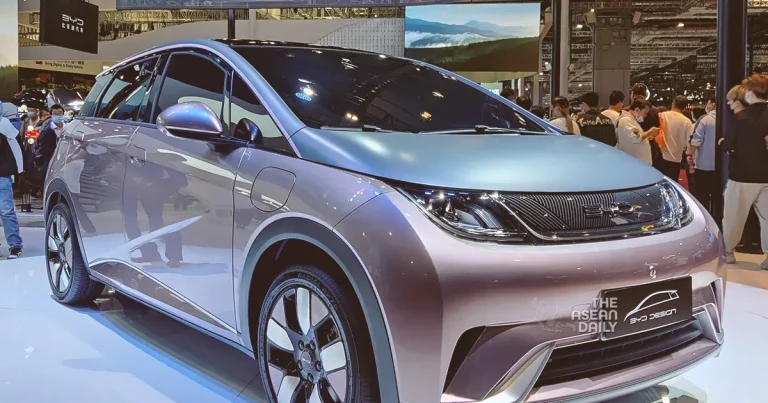9-9-2023 (KUALA LUMPUR) For a while now, 58-year-old pilot Mohd Radzi Desa has been contemplating his next automotive move, considering an electric vehicle (EV) as the logical upgrade from his current plug-in hybrid electric vehicle (PHEV). Radzi, who halted his purchases of traditional Internal Combustion Engine (ICE) vehicles in 2013, recognizes the appeal of EVs for their smooth, quiet rides and lower maintenance requirements, not to mention their environmental benefits.
With plans to acquire an EV by 2025, Radzi, like many Malaysians, is closely monitoring the impending import and excise duties on fully imported EVs. His interest has been piqued by Tesla’s recent announcement that they are officially taking orders for their EVs in Malaysia, with deliveries expected in the near future.
“Tesla is basically the pinnacle of electric vehicles,” Radzi enthuses. “It helps that they are bringing it in officially. My mind is 60 per cent made up, but I will still consider other brands when the time comes to make a decision.”
Tesla’s recent foray into the Malaysian market began with the availability of the mid-sized Model Y sports utility vehicle (SUV) for booking online, starting at RM199,000 (US$42,560) for the base model. Furthermore, in early September, Tesla revealed plans to introduce its Model 3 sedan into Malaysia, with a base model priced at RM189,000, making it the most affordable option in the region.
These developments by Tesla, coupled with similar efforts by other automotive firms in Malaysia, have ignited excitement and heightened expectations about Malaysia’s potential as an EV hub in Southeast Asia. While the EV industry in the region is still in its infancy, countries like Malaysia are actively competing to attract major companies and manufacturers, recognizing the industry’s exponential growth potential.
Malaysia’s Prime Minister Anwar Ibrahim recently emphasized the importance of EVs for the country, aligning with the Malaysian Automotive Association (MAA), which declared that Malaysia is on track to becoming an EV powerhouse in the region. Nevertheless, industry experts and analysts acknowledge that transitioning to EVs and establishing a dominant position in the region will require significant shifts, especially in making EVs more affordable to the general population.
Positive government policies have played a pivotal role in attracting investors and fostering the EV sector’s growth in Malaysia. In August, EP Manufacturing Berhad, a local auto parts manufacturer, inked an agreement with BAIC Motor Corporation Ltd, one of China’s leading automobile groups, to collaborate on local vehicle production, including EVs. Additionally, Chinese automaker Geely, which owns a 49.9 per cent stake in Malaysian manufacturer Proton, announced a substantial RM30 billion investment in the Automotive High-Tech Valley (AHTV) in Tanjung Malim, Perak, with a strong focus on EV development.
However, what sets Tesla apart in the Malaysian EV landscape is its surprising affordability compared to other brands. Shahrol Halmi, the co-founder of the Malaysia Electric Vehicles Owners Club (MyEVOC), commented, “It is very big news. BYD was a hot seller when it was launched earlier this year at RM170,000, but you don’t need to top up much more to get a Tesla Model Y, while a comparable BMW i4 is substantially higher in price.”
Malaysia’s EV market currently offers over 40 different EV models, ranging from established brands like BMW, Volvo, Mercedes, and Hyundai to newer entrants such as BYD, Ora, and Neta from China, as well as the luxury brand Rolls Royce.
Shahrol believes that Malaysia’s push into the EV sector gained momentum with the government’s approval of the Low Carbon Mobility Blueprint (LCMB) in October 2021. This policy framework aims to reduce emissions from the transportation sector, making it the second-largest emitter of Carbon Dioxide (CO2) after the energy sector. In the 2022 Budget, the government introduced incentives such as full exemptions from import and excise duties, sales tax exemptions, road tax exemptions, and income tax reliefs for the purchase of charging facilities for EVs. These incentives were extended to include import duty exemptions for components used in the local assembly of EVs, as well as exemptions for locally assembled completely knocked-down (CKD) EVs until 2027 and imported completely built-up (CBU) units until 2025. EV users will also be exempt from road tax until 2025.
Jigar Shah, head of sustainability research at Maybank Investment Banking Group, lauded these government policies as crucial for attracting investment in the EV sector. He emphasized that Malaysia’s proactive approach and commitment to increasing the share of renewables in its energy mix will position the country favorably to benefit from the impending EV boom.
Shah noted that local Malaysian companies like Petronas and Yinson are establishing charging stations, a critical development as consumers make the transition from ICE vehicles to EVs. Malaysia’s recent decision to target a 70 percent share of renewables in its total energy mix by 2050 is seen as highly favorable for the EV sector’s growth. Malaysia, as the third-largest car market within ASEAN, has an opportunity to develop an EV manufacturing base and ecosystem for both local and export markets.
The Malaysian government has set ambitious targets for the EV industry, aiming for EVs and hybrid vehicles to contribute 15 percent of the total industry volume (TIV) by 2030 and 38 percent of TIV by 2040. Vincent Lau, head of equity sales at Rakuten Trade, expressed optimism about Malaysia’s EV sector’s growth prospects, citing the affordability of brands like BYD and Ora.

In 2022, Malaysia witnessed a significant increase in EV sales, totaling 2,631, compared to just 271 sales the previous year. However, Malaysia still lags behind Thailand, which leads the region in EV production. In 2022, Thailand manufactured 92,746 EVs, a 38 percent increase from the previous year, and assembled 1.9 million vehicles overall. The Thai government has set an ambitious target of one million EVs on the road by 2030.
While Malaysia’s EV production figures for the previous year are unavailable, the country assembled more than 700,000 vehicles overall. Other Southeast Asian countries, including Indonesia and Vietnam, are also vying to attract investors in the EV industry. Indonesia aims to have EVs constitute one-fifth of all domestically manufactured vehicles by 2025, while Vietnam’s VinFast has shifted its focus exclusively to EVs.
The International Energy Association (IEA) predicts a 35 percent growth in global electric car sales this year, increasing its share of the overall car market to 18 percent. This rapid growth is transforming the global car manufacturing industry. Malaysia’s proactive approach, alongside Volvo and Mercedes’ local assembly of EVs, positions the country to reap the benefits of this transformative trend.
Charles Frump, managing director of Volvo Car Malaysia, expressed optimism about the future of Malaysia’s automotive industry, emphasizing Volvo’s commitment to electric cars. Volvo became the first manufacturer to assemble an EV in Malaysia – the XC40 SUV model – at its plant in Shah Alam, Selangor, last year. Malaysia has now become Volvo Cars’ regional hub, exporting EVs to neighboring countries such as Indonesia, Taiwan, Thailand, the Philippines, and Vietnam.
Mercedes has also indicated its intention to electrify 30 percent of its vehicles sold in Malaysia by 2030, given the country’s high EV penetration rates for its products globally. While the EV industry is relatively new in Malaysia, investors are still awaiting clearer market regulations, according to Malaysia’s International Trade and Industry Minister Tengku Zafrul Tengku Abdul Aziz.
Scaling up the charging network is crucial to accelerating EV adoption in Malaysia. The government aims to have 10,000 EV charging stations nationwide by 2025, comprising 9,000 units of alternating current (AC) type and 1,000 units of direct current (DC) type. Although over 1,000 EV charging stations are currently installed throughout Malaysia, concerns about charging infrastructure persist among consumers.
Shahrol of MyEvoc acknowledges the importance of a robust charging network for the EV experience but notes that it has significantly improved in recent years, making it easier to traverse the country. Nevertheless, the charging infrastructure remains underdeveloped in some regions, contributing to “range anxiety” among potential EV adopters.
One major obstacle to EV adoption in Malaysia is the higher price tag compared to ICE vehicles. This challenge has fueled hopes that Malaysian car manufacturers like Perodua and Proton, which collectively hold a 60 percent share of the vehicle market, will produce affordable homegrown EVs. Perodua CEO Zainal Abidin Ahmad has affirmed plans for the local assembly of affordable EV models, emphasizing that EVs need to become accessible to most Malaysians.
Ultimately, the affordability of EVs will be the key to their mass adoption in Malaysia. Vincent Lau of Rakuten Trade underscores that EVs will only become attractive to the masses when their prices align with popular models like the Perodua Myvi, which is sold for RM46,500.




